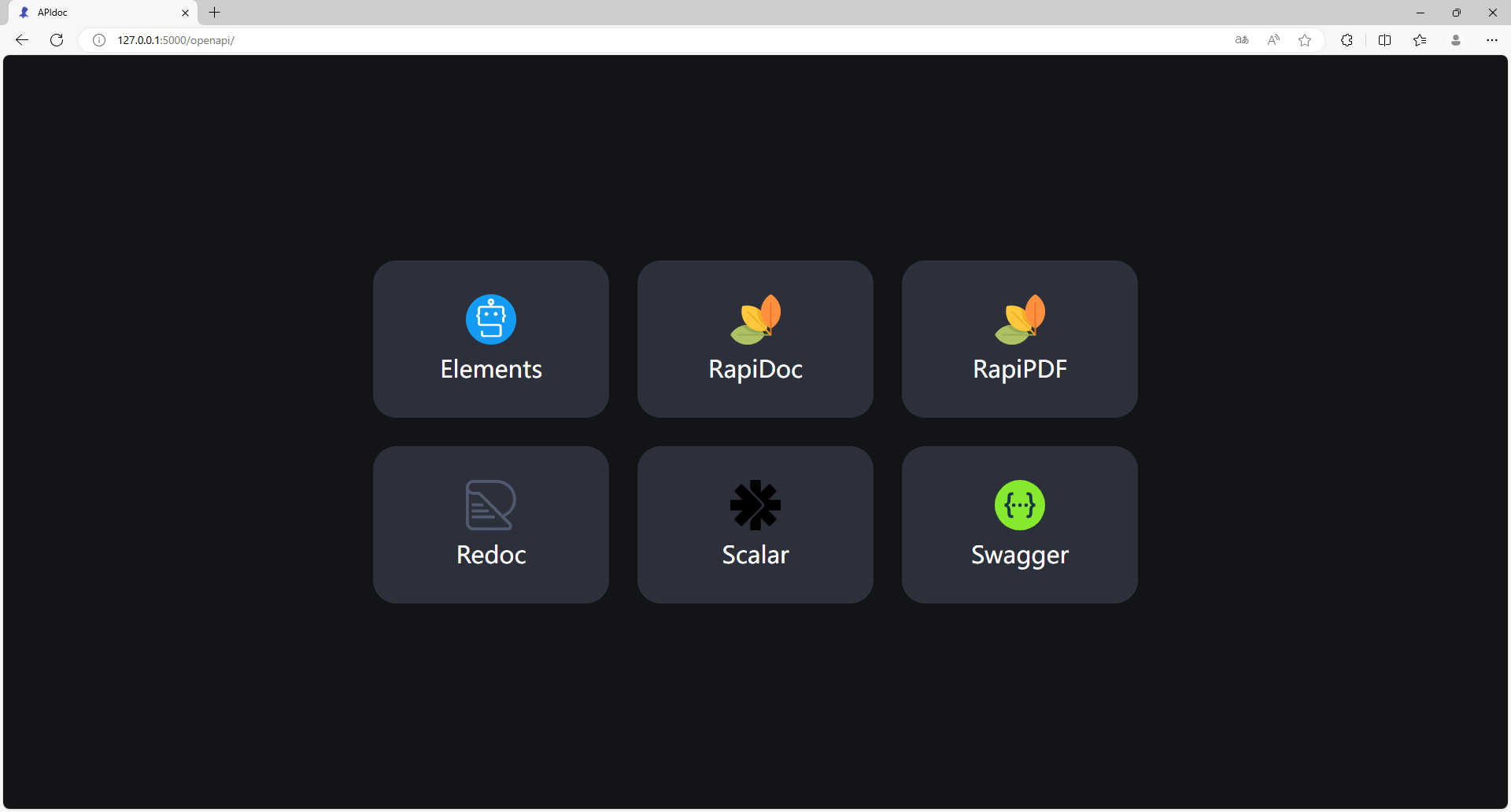
Security News
GitHub Actions Pricing Whiplash: Self-Hosted Actions Billing Change Postponed
GitHub postponed a new billing model for self-hosted Actions after developer pushback, but moved forward with hosted runner price cuts on January 1.
flask-openapi3
Advanced tools
Generate REST API and OpenAPI documentation for your Flask project.
Flask OpenAPI3 is a web API framework based on Flask. It uses Pydantic to verify data and automatic generation of interaction documentation.
The key features are:
Easy to code: Easy to use and easy to learn
Standard document specification: Based on OpenAPI Specification
Interactive OpenAPI documentation: Swagger, Redoc, RapiDoc, RapiPdf, Scalar, Elements
Data validation: Fast data verification based on Pydantic
Python 3.10+
flask-openapi3 is dependent on the following libraries:
pip install -U flask-openapi3[swagger]
or
conda install -c conda-forge flask-openapi3[swagger]
flask
commands.async def and use await.To install these dependencies with flask-openapi3:
pip install flask-openapi3[yaml]
# or
pip install flask-openapi3[async]
# or
pip install flask-openapi3[dotenv]
# or
pip install flask-openapi3[email]
# or all
pip install flask-openapi3[yaml,async,dotenv,email]
# or manually
pip install pyyaml asgiref python-dotenv email-validator
# OpenAPI UI plugins
pip install -U flask-openapi3[swagger,redoc,rapidoc,rapipdf,scalar,elements]
Here's a simple example, further go to the Example.
from pydantic import BaseModel
from flask_openapi3 import Info, Tag
from flask_openapi3 import OpenAPI
info = Info(title="book API", version="1.0.0")
app = OpenAPI(__name__, info=info)
book_tag = Tag(name="book", description="Some Book")
class BookQuery(BaseModel):
age: int
author: str
@app.get("/book", summary="get books", tags=[book_tag])
def get_book(query: BookQuery):
"""
to get all books
"""
return {
"code": 0,
"message": "ok",
"data": [
{"bid": 1, "age": query.age, "author": query.author},
{"bid": 2, "age": query.age, "author": query.author}
]
}
if __name__ == "__main__":
app.run(debug=True)
from pydantic import BaseModel, Field
from flask_openapi3 import OpenAPI, Tag, Info, APIView
info = Info(title="book API", version="1.0.0")
app = OpenAPI(__name__, info=info)
api_view = APIView(url_prefix="/api/v1", view_tags=[Tag(name="book")])
class BookPath(BaseModel):
id: int = Field(..., description="book ID")
class BookQuery(BaseModel):
age: int | None = Field(None, description="Age")
class BookBody(BaseModel):
age: int | None = Field(..., ge=2, le=4, description="Age")
author: str = Field(None, min_length=2, max_length=4, description="Author")
@api_view.route("/book")
class BookListAPIView:
a = 1
@api_view.doc(summary="get book list")
def get(self, query: BookQuery):
print(self.a)
return query.model_dump_json()
@api_view.doc(summary="create book")
def post(self, body: BookBody):
"""description for a created book"""
return body.model_dump_json()
@api_view.route("/book/<id>")
class BookAPIView:
@api_view.doc(summary="get book")
def get(self, path: BookPath):
print(path)
return "get"
@api_view.doc(summary="update book")
def put(self, path: BookPath):
print(path)
return "put"
@api_view.doc(summary="delete book", deprecated=True)
def delete(self, path: BookPath):
print(path)
return "delete"
app.register_api_view(api_view)
if __name__ == "__main__":
app.run(debug=True)
Run the simple example, and go to http://127.0.0.1:5000/openapi.
OpenAPI UI plugins are optional dependencies that require manual installation.
pip install -U flask-openapi3[swagger,redoc,rapidoc,rapipdf,scalar,elements]More optional ui templates goto the document about UI_Templates.

FAQs
Generate REST API and OpenAPI documentation for your Flask project.
We found that flask-openapi3 demonstrated a healthy version release cadence and project activity because the last version was released less than a year ago. It has 1 open source maintainer collaborating on the project.
Did you know?

Socket for GitHub automatically highlights issues in each pull request and monitors the health of all your open source dependencies. Discover the contents of your packages and block harmful activity before you install or update your dependencies.

Security News
GitHub postponed a new billing model for self-hosted Actions after developer pushback, but moved forward with hosted runner price cuts on January 1.

Research
Destructive malware is rising across open source registries, using delays and kill switches to wipe code, break builds, and disrupt CI/CD.

Security News
Socket CTO Ahmad Nassri shares practical AI coding techniques, tools, and team workflows, plus what still feels noisy and why shipping remains human-led.